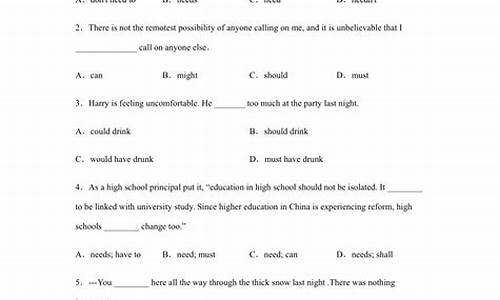您现在的位置是: 首页 > 教育新闻 教育新闻
高考语法情态动词_高考语法情态动词总结
tamoadmin 2024-06-17 人已围观
简介1.高考英语语法填空常填的虚词(介词、连词、冠词、代词、情态动词)有哪些,能帮我分类列举吗?2.高考英语 情态动词3.高考英语语法:高中英语语法-need 与dare 的动词用法 (二)4.公开课中如何把情态动词与高考考点结合起来5.高考情态动词语法题你对于这道题上的理解错误在于语义,不是语法。诚与你所说should 有竟然的意思,但在这里语境是我的家乡在三月通常是温暖的,但是有时也会很冷。CAN
1.高考英语语法填空常填的虚词(介词、连词、冠词、代词、情态动词)有哪些,能帮我分类列举吗?
2.高考英语 情态动词
3.高考英语语法:高中英语语法-need 与dare 的动词用法 (二)
4.公开课中如何把情态动词与高考考点结合起来
5.高考情态动词语法题

你对于这道题上的理解错误在于语义,不是语法。诚与你所说should 有竟然的意思,但在这里语境是我的家乡在三月通常是温暖的,但是有时也会很冷。CAN有“有时也会”的意思。如:It can be quite windy there, especially in spring. 那里有时容易刮风, 特别在春季。
以下是can的所有用法:
style="font-size: 18px;font-weight: bold;border-left: 4px solid #a10d00;margin: 10px 0px 15px 0px;padding: 10px 0 10px 20px;background: #f1dada;">高考英语语法填空常填的虚词(介词、连词、冠词、代词、情态动词)有哪些,能帮我分类列举吗?
《2010年高考英语语法精讲二十六 情态动词》由留学英语组我整理(www.liuxue86.com)。本内容整理时间为05月12日,如有任何问题请联系我们。
1、情态动词 + have done sth
这个结构有着特殊意义:用来表示猜测(设想可能发生过什么事情)或
想象(设想可能出现过什么不同的情况)
①should (ought to) have done sth 本来该做而未做
This wall oughtn?t to have been painted blue.
②need have done sth 本来有必要做而未做
You needn?t have told her the news.
③must have done sth 对过去所做动作的肯定推测
---We went to Paris.
---That must have been nice.
④can have done sth 对过去所做动作的否定或疑问推测
I don?t think he can have heard you. Call again.
Where can John have put the matches?
⑤may (might) have done sth 过去可能发生某事,与could相比,may和 might可能性较小,might 可能性更小;might 也可表示过去可能发生而未发生的事情。
Polly?s very late----she may (might) have missed her etrain.
You were stupid to try climbing there. You might have killed youself
⑥could have done sth
推测过去?可能?发生某事 (同can, 但can不用肯定句)
She could have gone off with some friends.
表示过去没有实现的可能性:某事可能发生,但却没有发生
You were stupid to go skiing there----you could have broken your leg.
表示有能力做而未做(虚拟语气)
You could have helped me !
(You were able to help me, but you didn?t.)
2、can could be able to 表示?能力?
can 通常表示现在的或?一般的能力?---即你无论什么时候想做就能
做到的能力, 指单纯的表示一个人有某种能力。
You can certainly cook, even if you can?t do anything else.
be able to表示某人通过努力、克服困难做成某事。
will be able to 表示将来的能力
I?ll be able to speak German in another few months.
could 表达 ?一般的能力?---即你过去想干什么就可以干什么
She could sing like an angel when she was a kid.
但could 不能表达过去某种具体的能力,此时用was able to, managed to 或 succeeded in 等
How many eggs were you able to get ?
3、can, could, may和might 表示?可能性?
可用来表示:①理论上的可能性(不涉及是否真发生);②提出建议
(提出解决某个问题的可能办法或者采取的行动);③在问句或否定句中表达现在的可能性)
Anybody who wants to can become a prison visitor.
①---What shall we do ?
---We can try asking Lucy for help.②
Who can that be at the door ? Can it be Polly?③
may可用来表达:①将来的可能性;②说话时某事可能是真实的
We may go climbing this summer.①
You may be right.②
could / might可用来表示:①说话时某事可能是真实的;②将来
某事有可能发生,但不表示特别可能发生。
You could be right, but I don?t think you are.①
It could rain later on this evening.②
4、can, could, may 和might表示?允许?
①请求允许:它们都可以表示请求允许做某事,could 和 might并不是表示过去
Can (May, Could) I borrow your umbrella ?
②允许:当我们允许某人做某事时,我们用can和may来表达,而不能使用could和might
You may / can watch TV for as long as you like. (不用could, might; mustn?t 有?拒绝?的意思)
---Could I use your phone?
---Yes, of course you can /may. (No, you can?t / may not.)
5、can和could表示提议和请求
它们常用来提议为某人做某事或请求别人做某事,could更客气,更
含尊敬的成分,这种用法常见于陈述句和疑问句中
①提议:
Can I carry your bag ?
I could / can do the shopping for you, if you?re tired.
②请求和命令:
Could / Can you help me with this letter?
You can / could start by cleaning the car.
6、情态动词will
①预测未来(第一人称用shall),或发布命令
---There?s someone coming up the stairs.
---That?ll be Mary.
You?ll start work at six o?clock.
②自愿与意向
I will (不用 I shall) 表示自愿做某事,或主动提出做某事,或表达坚定的意图
---Can somebody help me ?
--- I will.
I?ll break your neck.
will you常用来提出要求或下命令,或提出请求
Will you come this way, please?
Will you have some more wine ?
用won?t表示拒绝
No, I won?t !
She won?t open the door.
7、shall
用于第一人称,表示征求对方的意见(说话人做某事)。
用于第一、第三人称疑问句中,表示说话人征求对方的意见或向对方请示。
用于第二、第三人称,表示说话人给对方的命令、警告、允诺或威胁。
8、常用情态动词的回答
①---Must we hand in our plan ?
---Yes, you must. (No, you needn?t.)
②---Need I come ?
---Yes, you must. (No, you needn?t.)
③---May I smoke here ?
---Yes, please. (Certainly. / Yes, you may. )
(No, you mustn?t. / may not. / Please don?t.)
④---Could / Can I offer you some coffee ? (提议)
(---Will / Would you have some coffee ?)
---Yes, please. / Yes, I?d like some ,please. (不用Yes, you can.)
(No, thank you.) (不用No, you can?t.)
⑤---Could / Can / Would / Will you (please) open the door ?(请求)
---Yes, of course (I will). (No, I?m afraid I can?t.) 《2010年高考英语语法精讲二十六 情态动词》由留学英语组我整理(www.liuxue86.com)
高考英语 情态动词
介词:in , on , at 这三者可以表示时间介词也可以表示地点介词, 还有over , beside等。
连词:and , but , although , 通常连接两个句子的。
冠词: 不定冠词,a , an , 定冠词 the
代词: 分人和物,像he , her , i , you 都是代词,something, everything这些也是代词。
情态动词:
can 表示能力,must 表示必须, should 表示应该, 这些比较经常考。
有其他不懂得可以再追问我。
高考英语语法:高中英语语法-need 与dare 的动词用法 (二)
too soon太早 太快
so soon这么快
much soon也很快
very soon很快, 立刻, 马上
if it is the best thing to do,it cannot be done too soon
如果这是最好的事,它不能做的太快
以上是我查找的翻译 我怀疑题目本身有问题 翻译读起来怪怪的。
公开课中如何把情态动词与高考考点结合起来
《高中英语语法-need 与dare 的动词用法 (二)》由liuxue86.com我整理。本内容整理时间为05月12日,如有任何问题请联系我们。
need 与dare 的动词用法 (二)
4.Dare作实义动词和实义动词变化相同,有人称、数和时态的变化。
1) She dares to answer these questions.
2) We should dare to think , speak and do.
3) Do you dare to touch the snake?
4) She said she dared.
5) He never dare to come here.
6) You should do it if you dare.
7) She lied on the bed , not daring to make a noise.
8) I didn't know that how he dared to drive a car.
[示例]考题1No one ____ say that he could see the Emperor?s new
clothes.
A. dare B. Needs C. Dared to D. need to
解析根据提干要求表示过去的情况即那时没有人有胆量敢说他没看见皇帝的
新衣裳,因此应选C,因dare表示过去式是实义动词才合乎题意。
考题2You ____ bring many books back until next month.
A. need to B. Dare to C. Dare not D. needn?t
分析据题旨意,句子后用了until介词+时间的介词短语作时间状语,那么前
面的动词bring是终止性动词应使用否定式表示没必要,而dare not意为不敢,
不合题意,所以正确答案是D。
考题3Tom wanted me to play truant this afternoon with him ,
but I ____ do so.
A. dared not B. Didn?t dare to C. Not dare D. dare not
分析据该题意也是说过去的情况,在A项中dare作为情态动词不能用过去式,
C和D项均不合题意。答案B,是表示过去式,dare在这里作为实义动词前面
用助动词的过去,后面to 可以跟不定式,可断定适合题意,所以该题答案选B。
考题4Father sent me the book , so I ____ to him for it.
A. needn?t write B. Needn?t have written C. dare not write
D. dare not have written
分析据题意:父亲把书寄来了,我本没必要给他写信,但信已写了。所以该选
项的B答案,此答案needn?t接动词的完成式表示过去本来没必要做的事,而做
了,所以与该题达意。
习题
1. You must pay the money , but you ____ do so at once.
A. mustn?t B. Dare not C. Needn?t D. don?t need.
2. You ____ try it again.
A.. needn?t to B. Needs C. Needn?t D. didn?t need
3. I wonder if he ____ wait any longer.A. need B. Needs C. Need to
D. doesn?t need
4. She ____ kill the snake . She is afraid of it.
A. doesn?t dare B. Dares not to C. Dare not D. dare to
5. Being scolded by the teacher , the boy stood before him without
____ his head.
A. daring lift B. Daring to lift C. Daring lifting D. dare to
lift 《高中英语语法-need 与dare 的动词用法 (二)》由liuxue86.com我整理
高考情态动词语法题
此公开课中,将情态动词与高考考点结合起来,可以采取以下方法:
1、明确考点:首先,需要明确情态动词在高考中的考点,例如情态动词的用法、形式、意义等。在讲解情态动词时,可以结合高考真题进行举例和讲解,让学生了解情态动词在高考中的重要性和实际应用。
2、总结归纳:在讲解完情态动词的用法后,可以进行总结归纳,帮助学生更好地掌握情态动词的用法和意义。可以将情态动词的用法和形式进行归纳整理,让学生进行记忆和背诵。
这里的needn't
可以用
don't
need
to代替,意思上是这样的,因为题中要考察情态动词的用法,所以就给你needn't
这个词了,这个词跟need没什么关系,并不是need的否定形式,就是一个单独特殊用法。
第二题不就是“我的意思是你当时不应该以那样的方式跟他说的”吗?没涉及到什么时态用法或情态动词用法的,看似是个考察情态动词用法的题,实则跟情态动词没关系。









